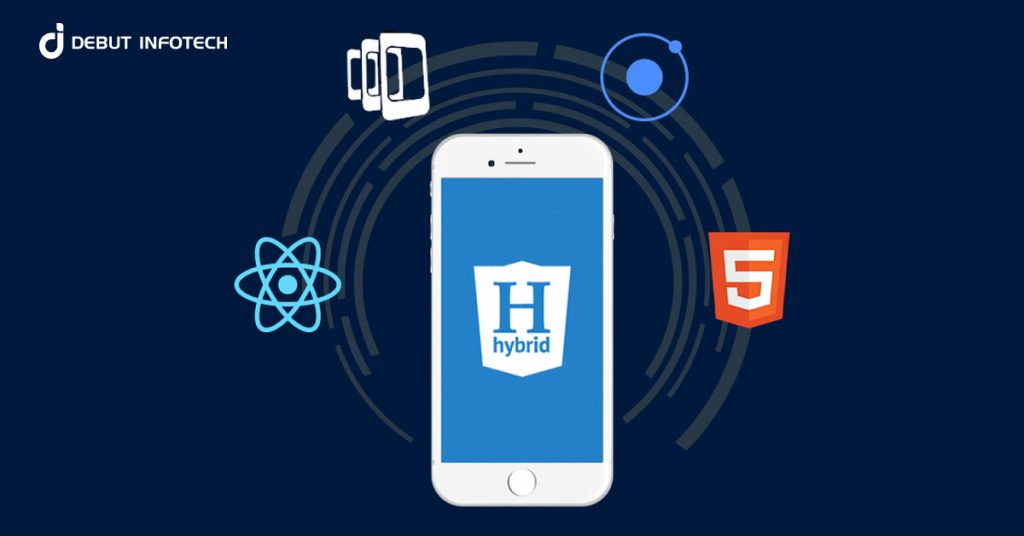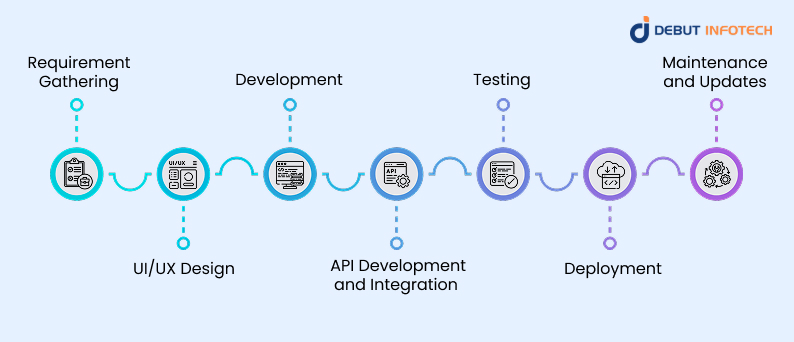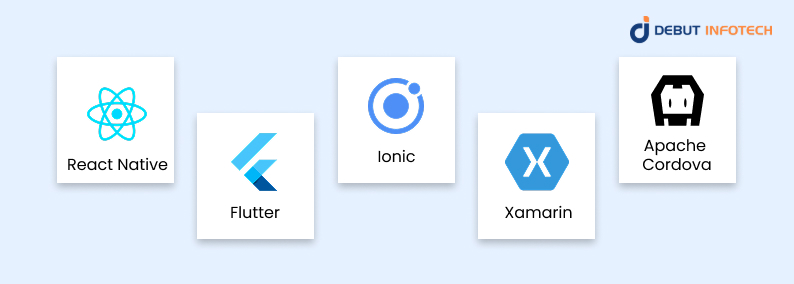
|
Getting your Trinity Audio player ready...
|
In today’s mobile-first world, businesses aiming to expand their digital footprint increasingly seek faster, cost-effective ways to reach users on iOS and Android platforms. That’s where hybrid app development comes into play. If you’re wondering what is hybrid app development, it refers to the creation of mobile applications that combine elements of both native and web apps. These apps are built using web technologies like HTML, CSS, and JavaScript, and then wrapped in a native shell to function across multiple platforms.
Understanding what is hybrid app development involves more than just defining it—it requires a deep dive into how it works, why it’s gaining traction, and how businesses can harness it to reduce time-to-market and development costs. This comprehensive guide explores everything from hybrid app benefits and frameworks to examples, use cases, and how companies like Debut Infotech deliver full-scale hybrid app development services.
Launch Your Hybrid App with Confidence
Looking to build a cross-platform app without stretching your budget? Debut Infotech delivers robust, scalable hybrid app solutions tailored to your business goals.
What is a Hybrid App?
A hybrid app is a mobile application that blends features of both native apps and web applications. It is developed using web technologies (HTML, CSS, JavaScript) and then encapsulated within a native application shell using tools like Cordova or Capacitor. This enables the app to run on various mobile platforms like Android and iOS with a single codebase.
Unlike native apps written in platform-specific languages like Swift or Kotlin, a hybrid mobile application allows developers to write code once and deploy it across multiple operating systems. This cross-platform capability is the defining advantage of hybrid mobile apps, making them a go-to choice for startups, SMEs, and even enterprise-level businesses seeking rapid scalability.
Hybrid App vs Native App vs Web App
Understanding the difference between app types is crucial before diving deeper into hybrid mobile application development.
- Native App: Built specifically for one platform using platform-specific languages. Offers the best performance and user experience, but is time-consuming and expensive.
- Web App: This runs in a browser and doesn’t need installation. It is easy to develop and update, but it lacks access to device hardware.
- Hybrid App: Combines native shell and web technologies. Faster development with moderate access to device features.
| App Type | Codebase | Performance | Hardware Access | Maintenance | Cost |
| Native | Separate per platform | Best | Full | High | Expensive |
| Web | Single (web) | Moderate | Limited | Low | Low |
| Hybrid | Single | Good | Moderate | Medium | Affordable |
Choosing between these app types depends on your project’s goals. If you need high performance and deep hardware integration, native is best. If time and budget are tight and the app doesn’t need deep native functionality, hybrid apps offer an excellent middle ground—blending efficiency, flexibility, and usability.
The Hybrid App Development Process

Creating a high-quality hybrid mobile app involves much more than just writing code. A structured, end-to-end mobile app development lifecycle ensures consistency, performance, and reliability across both iOS and Android platforms. Below is a deeper look into each critical phase of the hybrid app development process:
1. Requirement Gathering
This foundational phase involves close collaboration with stakeholders to define the app’s goals, target users, core features, technical requirements, and platform expectations. Whether you’re developing an e-commerce app, a booking platform, or a fintech solution, a clear understanding of the app’s purpose and scope ensures that development aligns with business objectives.
2. UI/UX Design
User experience is key to app success. In this phase, designers craft intuitive, responsive interfaces that adapt seamlessly to various screen sizes and operating systems. Wireframes, mockups, and interactive prototypes are developed using tools like Figma or Adobe XD, ensuring the app delivers a consistent visual and functional experience on both Android and iOS devices.
3. Development
Once the design is approved, developers begin coding the app using a chosen hybrid application framework such as React Native, Flutter, or Ionic. This is where front-end components (buttons, navigation, animations) and back-end logic (data handling, authentication, user flows) are implemented. The single codebase approach of hybrid apps significantly speeds up this stage compared to native development.
4. API Development and Integration
Hybrid apps development often relies on robust backend services to handle data processing, authentication, user management, and external integrations. During this phase, developers build RESTful APIs or GraphQL endpoints and connect the app to necessary third-party services—such as payment gateways, cloud storage, or geolocation services—to enable full functionality.
5. Testing
Testing ensures your app runs smoothly across devices, platforms, and user conditions. Hybrid app testing includes functional testing, UI/UX testing, device compatibility checks, performance benchmarking, and security validations. Automated testing tools, simulators, and real-device testing are used to eliminate bugs and refine the user experience.
6. Deployment
After thorough testing, the app is prepared for release. The deployment phase includes compiling the app for respective platforms (Android and iOS), generating build versions, and submitting them to the Google Play Store and the Apple App Store. This also involves meeting app store compliance requirements, including privacy policies, screenshots, and metadata.
7. Maintenance and Updates
Post-launch support is essential to address bugs, optimize performance, and adapt to user feedback or operating system updates. Regular maintenance ensures your hybrid app stays secure, up-to-date, and aligned with evolving user needs or market trends.
Each stage in the hybrid app development process is interconnected. By following a well-structured lifecycle, businesses can reduce time to market, control costs, and ensure a consistent, high-quality user experience across all platforms. Whether you’re building an MVP or scaling a full-featured application, this methodology ensures technical efficiency and long-term success.
Top Hybrid App Development Frameworks

A key factor in successful hybrid app development is selecting the right framework. The framework you choose affects not only the development speed and cost but also the app’s performance, UI responsiveness, access to native features, and long-term maintainability. Below are some of the most popular and widely adopted example of hybrid application frameworks that power cross-platform mobile apps today:
1. React Native
Created and maintained by Facebook, React Native has gained massive popularity among developers for its ability to build apps that feel truly native. While it is technically considered a cross-platform framework, it supports the hybrid development philosophy of code reuse across platforms. It uses JavaScript and React, making it ideal for teams already familiar with web development. React Native supports native modules for enhanced performance and offers a strong developer community and third-party plugin ecosystem.
2. Flutter
Flutter, developed by Google, is a UI toolkit that enables developers to build natively compiled apps for mobile, web, and desktop from a single codebase. Its standout feature is the “hot reload,” which allows developers to see code changes in real time. Flutter uses the Dart programming language and provides a wide range of customizable widgets, delivering high-performance visuals and native-like user experiences. It’s especially useful for apps that require custom UI and fast rendering.
3. Ionic
Ionic is one of the oldest and most trusted hybrid app frameworks. Built on top of web technologies like HTML, CSS, and JavaScript, it uses a web view wrapped in a native shell and integrates seamlessly with Angular, React, or Vue. Ionic provides a comprehensive UI component library, making it easy to design and deploy polished mobile interfaces. It also supports tools like Capacitor and Cordova for accessing native features, offering great flexibility for hybrid developers.
4. Xamarin
A Microsoft product, Xamarin allows developers to build hybrid apps using C# and .NET, reusing around 90% of code across platforms. Xamarin applications offer native API access and performance, making it a good choice for enterprise-grade solutions that demand platform-specific capabilities while maintaining a single codebase. It integrates well with Visual Studio, making it convenient for Windows-based development teams.
5. Apache Cordova
Formerly known as PhoneGap, Apache Cordova is one of the pioneers in hybrid app development. It wraps web apps in a native shell, allowing them to run across multiple platforms with minimal modification. Cordova’s extensive plugin architecture allows access to native device functions like cameras, GPS, and file storage. Although it’s no longer as popular as newer frameworks, it still supports legacy projects and simple hybrid solutions.
Choosing the Right Framework
Selecting the right hybrid app development framework depends on several factors, including your team’s skill set, project complexity, app performance needs, and long-term support plans. For example, React Native and Flutter are preferred for high-performance apps, while Ionic and Cordova are great for content-driven or simple utility apps. Xamarin may be the best fit for enterprise apps that already rely on Microsoft tools.
Ultimately, the framework sets the foundation for your app’s functionality, scalability, and user experience, so making the right choice is crucial to the success of your mobile strategy. Partnering with an experienced hybrid mobile app development company like Debut Infotech can help you evaluate the best fit for your unique goals and technical requirements.
Advantages of Hybrid Application Development
Hybrid application development offers several benefits that have contributed to its growing popularity:
1. Cost Efficiency: One major advantage of hybrid app development is cost savings. Instead of developing separate apps for Android and iOS, businesses can invest in a single development process, thereby cutting costs significantly.
2. Faster Time-to-Market: Since hybrid apps share a common codebase across platforms, the app development process becomes faster, allowing companies to deploy their apps more quickly than native alternatives.
3. Easy Maintenance: Updates and bug fixes are simpler with hybrid mobile apps because changes are made to a single codebase. This also results in reduced long-term maintenance costs.
4. Wider Market Reach: By deploying across platforms simultaneously, businesses can reach a broader user base without doubling their development efforts.
5. Seamless Integration: Hybrid applications can integrate easily with device file systems and web-based services via APIs and plugins, offering much of the functionality of native apps.
Common Use Cases for Hybrid Apps
Hybrid apps are suitable for a wide range of business models and industries:
- E-commerce apps with responsive UI and quick deployment cycles
- Content-driven apps that prioritize information delivery over hardware functionality
- Enterprise apps for internal teams that need cross-platform accessibility
- MVPs and prototypes requiring quick launch and user testing
What Are Hybrid Applications Used For?
Hybrid applications are ideal when you need:
- Multi-platform support without duplicating development efforts
- Faster deployment and updates
- Lower mobile app development cost
- Moderate use of device features without needing intensive hardware interaction
These apps are especially favored in startups and SMEs where budget and speed are crucial.
Popular Hybrid Mobile Application Examples
Several global companies have adopted hybrid mobile development successfully. Notable hybrid mobile app examples include:
- Instagram – A hybrid structure that allows for media-rich features with native-like performance
- Uber – Uses hybrid elements for faster updates and scalability
- Twitter – Its hybrid components ensure speed and responsiveness
- Evernote – Combines native functionality with web elements for better performance across platforms
These hybrid mobile application examples demonstrate how high-performing hybrid apps can be when built correctly.
Hybrid App Development Cost
Several factors influence hybrid app development cost, including:
- App complexity and feature set
- UI/UX design customization
- Choice of hybrid app framework
- Backend/API integrations
- Testing requirements
- Post-launch support
In general, hybrid apps are 30–50% more cost-effective compared to developing separate native apps for each platform. For businesses concerned about budget, working with an experienced hybrid mobile app development company like Debut Infotech can ensure cost control without compromising quality.
Hiring the Right Hybrid Mobile Developer
Finding the right hybrid mobile developer is crucial. An ideal candidate or team should have:
- Strong knowledge of hybrid mobile app development frameworks
- Experience with backend and API development
- UI/UX design capabilities
- Familiarity with app store submission guidelines
- Post-deployment support experience
Whether you’re a startup looking for MVP development or an enterprise scaling your mobile strategy, choosing to hire mobile developers from on demand app development company with cross-platform experience accelerates delivery while ensuring quality.
Debut Infotech’s Role in Hybrid App Development
As a leading hybrid mobile app development company, Debut Infotech offers full-cycle hybrid app development services tailored to your business goals. From ideation and design to development and deployment, we help brands build scalable, cross-platform apps that deliver performance and user engagement.
Our team leverages the best mobile app development frameworks, builds robust backends through expert API development, and ensures cost transparency throughout your mobile app development timeline. Whether you’re a startup or an established enterprise, Debut Infotech provides end-to-end support that aligns with your vision and growth plan.
Build High-Performance Hybrid Apps with Experts
From concept to deployment, our hybrid app developers help you build apps that work seamlessly across Android and iOS—saving you time, money, and effort.
Conclusion
In an era where digital speed and cross-platform access define success, hybrid app development stands out as a strategic solution for businesses aiming to build cost-effective, scalable, and user-friendly mobile applications. By understanding what is hybrid app development, companies can make informed decisions that align technology with business goals, streamline development efforts, and reduce costs.
With tools, frameworks, and services constantly evolving, hybrid mobile development offers the flexibility needed to innovate fast without compromising quality. Partnering with experienced hybrid app development companies like Debut Infotech ensures your app is built with the right foundation, balancing performance, design, and compliance. Whether you’re building a new product or optimizing an existing one, hybrid app development is a powerful path to digital success.
Frequently Asked Questions
A. Hybrid app development is the process of building mobile applications using web technologies like HTML, CSS, and JavaScript, which are then wrapped in a native container to run on both iOS and Android platforms from a single codebase.
A. A hybrid app runs on multiple platforms using one codebase, while a native app is built separately for each platform using platform-specific languages. Native apps offer better performance, but hybrid apps are faster and more cost-effective to develop.
A. Key benefits include lower development costs, faster time-to-market, cross-platform support, simplified maintenance, and wider reach—all with relatively consistent performance and user experience.
A. Yes, hybrid apps are ideal for startups, SMEs, and even large enterprises looking for cost-effective, scalable solutions, especially when they need to support both Android and iOS users simultaneously.
A. Popular hybrid frameworks include React Native, Flutter, Ionic, Xamarin, and Apache Cordova. The right choice depends on your app’s requirements, performance needs, and developer expertise.
A. Costs vary based on app complexity, features, design, and integration needs. However, hybrid development typically costs 30–50% less than building separate native apps for each platform.
A. Absolutely. Debut Infotech offers end-to-end hybrid app development services—from UI/UX design to backend development and deployment—ensuring scalable, secure, and high-performing mobile apps.


